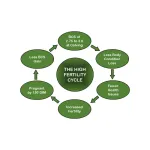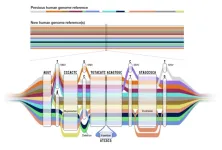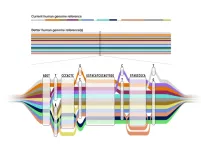(Press-News.org) CLEVELAND - Inhibiting a protein on the surface of immune cells could offer new strategies for treating severe asthma, Cleveland Clinic researchers found.
Researchers discovered a new way a protein called MCEMP1 contributes to severe inflammation in the airway and lungs. The discovery, published in Nature Communications, provides critical information for developing therapeutic interventions to treat long-term lung conditions, including asthma, on a biological level.
The study was conducted in a lab led by Jae Jung, PhD, chair of the Cancer Biology Department, director of the Infection Biology program, and director of the Sheikha Fatima bint Mubarak Global Center for Pathogen & Human Health Research.
Severe asthma is caused by airway inflammation in response to a trigger, like allergens or air pollution. The inflammation causes the airway to swell up and become narrower and stiffer, which makes breathing difficult. Asthma currently affects more than 25 million people in the U.S and 300 million people worldwide.
Inflammation is part of innate immune response, or the process the body uses to summon immune cells to combat pathogens. Inhalers treat the inflammation in the airway, but do not address the underlying biological causes of the recurring inflammation.
Mast cells release histamines and elicit other immune responses that cause allergic inflammation, so researchers examined what proteins on that cell are critical to prompting a severe immune response.
"A rapid increase in mast cell numbers is associated with these more severe cases of asthma,” says Youn Jung Choi, PhD, a postdoctoral fellow and first author on the paper. “What we discovered is a new molecular mechanism that, if turned off, can reduce the number of mast cells and, therefore, the level of inflammation.”
MCEMP1 is a surface-level protein on mast cells. Previous research implicated MCEMP1 in multiple inflammatory lung diseases in addition to asthma, including chronic obstructive pulmonary disease (COPD) and idiopathic pulmonary fibrosis (IPF).
When MCEMP1 expression was eliminated on the surface of the mast cell, researchers saw reduced airway inflammation and lung damage. The study showed that MCEMP1 was associated with elevated mast cell numbers. Researchers observed higher rates of inflammation and lung function defect when MCEMP1 was expressed on mast cells.
MCEMP1 is expressed highly in lung cells, but its expression is induced during immune response in other parts of the body as well. That shows the value in searching for MCEMP1 function in other parts of the body, Dr. Choi says.
“Understanding how this mechanism works in the lung not only provides us with a path to new therapies for asthma, but it could be a finding that helps us map out similar functions in other inflammatory diseases in the lung and throughout the body,” she says.
END
New Cleveland Clinic research links immune cell receptors to asthma, inflammatory lung disease
Using therapeutics to target the protein on the surface of mast cells could provide relief for patients with severe asthma
2023-05-10
ELSE PRESS RELEASES FROM THIS DATE:
Entangled quantum circuits
2023-05-10
A group of researchers led by Andreas Wallraff, Professor of Solid State Physics at ETH Zurich, has performed a loophole-free Bell test to disprove the concept of “local causality” formulated by Albert Einstein in response to quantum mechanics. By showing that quantum mechanical objects that are far apart can be much more strongly correlated with each other than is possible in conventional systems, the researchers have provided further confirmation for quantum mechanics. What’s special about ...
Simple management steps for a high fertility cycle in your dairy herd
2023-05-10
Philadelphia, May 10, 2023 – The dairy industry has seen a revolution over the past two decades in fertility success within herds. Widely adopted fertility programs are at the heart of this leap forward, along with the industry’s increased understanding—and optimization—of the holistic interactions among the body condition, overall health, and fertility of a dairy cow. In a recent mini-review appearing in a special fertility issue of JDS Communications®, published by Elsevier, researchers from the University of ...
Scientists release a new human “pangenome” reference
2023-05-10
Researchers have released a new high-quality collection of reference human genome sequences that captures substantially more diversity from different human populations than what was previously available. The work was led by the international Human Pangenome Reference Consortium, a group funded by the National Human Genome Research Institute (NHGRI), part of the National Institutes of Health.
The new “pangenome” reference includes genome sequences of 47 people, with the researchers pursuing the goal of increasing that number to 350 by mid-2024. With each person carrying a paired set of chromosomes, the current reference actually includes 94 distinct genome ...
Crops evolved by swapping genetic modules between cells
2023-05-10
Comparing individual cells across corn, sorghum, and millet reveals evolutionary differences among these important cereal crops, according to a new study led by New York University researchers.
The findings, published in Nature, bring researchers closer to pinpointing which genes control important agricultural traits such as drought tolerance, which will help scientists faced with a changing climate adapt crops to drier environments.
Corn, sorghum, and millet provide food for humans and animals around the world. Corn and sorghum are ancient relatives that evolved into two different species roughly 12 million years ago, and millet is a more distant relative.
Despite ...
Behind the scenes of a major genomic discovery
2023-05-10
EMBARGOED UNTIL WEDNESDAY, MAY 10, 2023, AT 11AM ET
New York, NY (May 10, 2023)—Eimear Kenny, PhD, had just completed undergrad and was working in her first computational genomics job more than 20 years ago when scientists announced the first (nearly) complete sequencing of the human genome—what was considered at the time to be the fundamental blueprint for all humans. The Human Genome Project aimed to map the entire genome in an effort to accelerate the diagnosis and eventual treatment of common and rare diseases.
Now, Dr. Kenny, ...
Human pangenome reference will enable more complete and equitable understanding of genomic diversity
2023-05-10
UC Santa Cruz scientists, along with a consortium of researchers, have released a draft of the first human pangenome—a new, usable reference for genomics that combines the genetic material of 47 individuals from different ancestral backgrounds to allow for a deeper, more accurate understanding of worldwide genomic diversity.
By adding 119 million bases—the “letters” in DNA sequences—to the existing genomics reference, the pangenome provides a representation of human genetic diversity that was not possible with a single reference genome. It is highly accurate, more complete and dramatically increases ...
New ‘pangenome’ offers more inclusive view of human genome
2023-05-10
New Haven, Conn. — When it was launched in April 2003, the Human Genome Project helped revolutionize biomedical research by providing scientists a reference map that allowed them to analyze DNA sequences for genetic clues to the origins of a host of diseases.
Twenty years later, a team of researchers that includes Yale scientists has created a new “pangenome” that fills in missing sequencing gaps from the original genome project and greatly expands the diversity of genomes represented.
The achievement is described in ...
Study: palliative care provided at point of oncology surgery does not improve patient outcomes
2023-05-10
One of the most important advances in palliative care in oncology over the past 15 years has been the recognition that palliative care specialists can improve cancer patients’ outcomes well before their end of life.
Palliative care is specialized care provided to individuals with a serious illness that focuses on decision-making support, pain and symptom management, as well as psychosocial interventions to improve quality of life.
Several past randomized clinical trials have shown palliative care specialists can improve the quality of life and lengthen the ...
Investigating social media to evaluate emergency medicine physicians’ emotional well-being during COVID-19
2023-05-10
About The Study: In this study, key thematic shifts and increases in language related to anxiety, anger, depression, and loneliness were identified in the content posted on social media by academic emergency medicine physicians and resident physicians during the pandemic. Social media may provide a real-time and evolving landscape to evaluate thematic content and linguistics related to emotions and sentiment for health care workers.
Authors: Anish K. Agarwal, M.D., M.P.H., M.S., of the ...
Analysis of BMI in early and middle adulthood and estimated risk of gastrointestinal cancer
2023-05-10
About The Study: In this secondary analysis of the Prostate, Lung, Colorectal, and Ovarian Cancer Screening Trial, overweight and obese body mass index (BMI) in early and middle adulthood was associated with an elevated risk of colorectal cancer and non-colorectal gastrointestinal cancers. The results of the current study prompt further exploration into the mechanistic role of obese BMI in carcinogenesis.
Authors: Holli A. Loomans-Kropp, Ph.D., M.P.H., of Ohio State University in Columbus, is the corresponding author.
To access the embargoed study: Visit our For The Media website at this link https://media.jamanetwork.com/
(doi:10.1001/jamanetworkopen.2023.10002)
Editor’s ...
LAST 30 PRESS RELEASES:
Trapping light on thermal photodetectors shatters speed records
New review highlights the future of tubular solid oxide fuel cells for clean energy systems
Pig farm ammonia pollution may indirectly accelerate climate warming, new study finds
Modified biochar helps compost retain nitrogen and build richer soil organic matter
First gene regulation clinical trials for epilepsy show promising results
Life-changing drug identified for children with rare epilepsy
Husker researchers collaborate to explore fear of spiders
Mayo Clinic researchers discover hidden brain map that may improve epilepsy care
NYCST announces Round 2 Awards for space technology projects
How the Dobbs decision and abortion restrictions changed where medical students apply to residency programs
Microwave frying can help lower oil content for healthier French fries
In MS, wearable sensors may help identify people at risk of worsening disability
Study: Football associated with nearly one in five brain injuries in youth sports
Machine-learning immune-system analysis study may hold clues to personalized medicine
A promising potential therapeutic strategy for Rett syndrome
How time changes impact public sentiment in the U.S.
Analysis of charred food in pot reveals that prehistoric Europeans had surprisingly complex cuisines
As a whole, LGB+ workers in the NHS do not experience pay gaps compared to their heterosexual colleagues
How cocaine rewires the brain to drive relapse
Mosquito monitoring through sound - implications for AI species recognition
UCLA researchers engineer CAR-T cells to target hard-to-treat solid tumors
New study reveals asynchronous land–ocean responses to ancient ocean anoxia
Ctenophore research points to earlier origins of brain-like structures
Tibet ASγ experiment sheds new light on cosmic rays acceleration and propagation in Milky Way
AI-based liquid biopsy may detect liver fibrosis, cirrhosis and chronic disease signals
Hope for Rett syndrome: New research may unlock treatment pathway for rare disorder with no cure
How some skills become second nature
SFU study sheds light on clotting risks for female astronauts
UC Irvine chemists shed light on how age-related cataracts may begin
Machine learning reveals Raman signatures of liquid-like ion conduction in solid electrolytes
[Press-News.org] New Cleveland Clinic research links immune cell receptors to asthma, inflammatory lung diseaseUsing therapeutics to target the protein on the surface of mast cells could provide relief for patients with severe asthma






